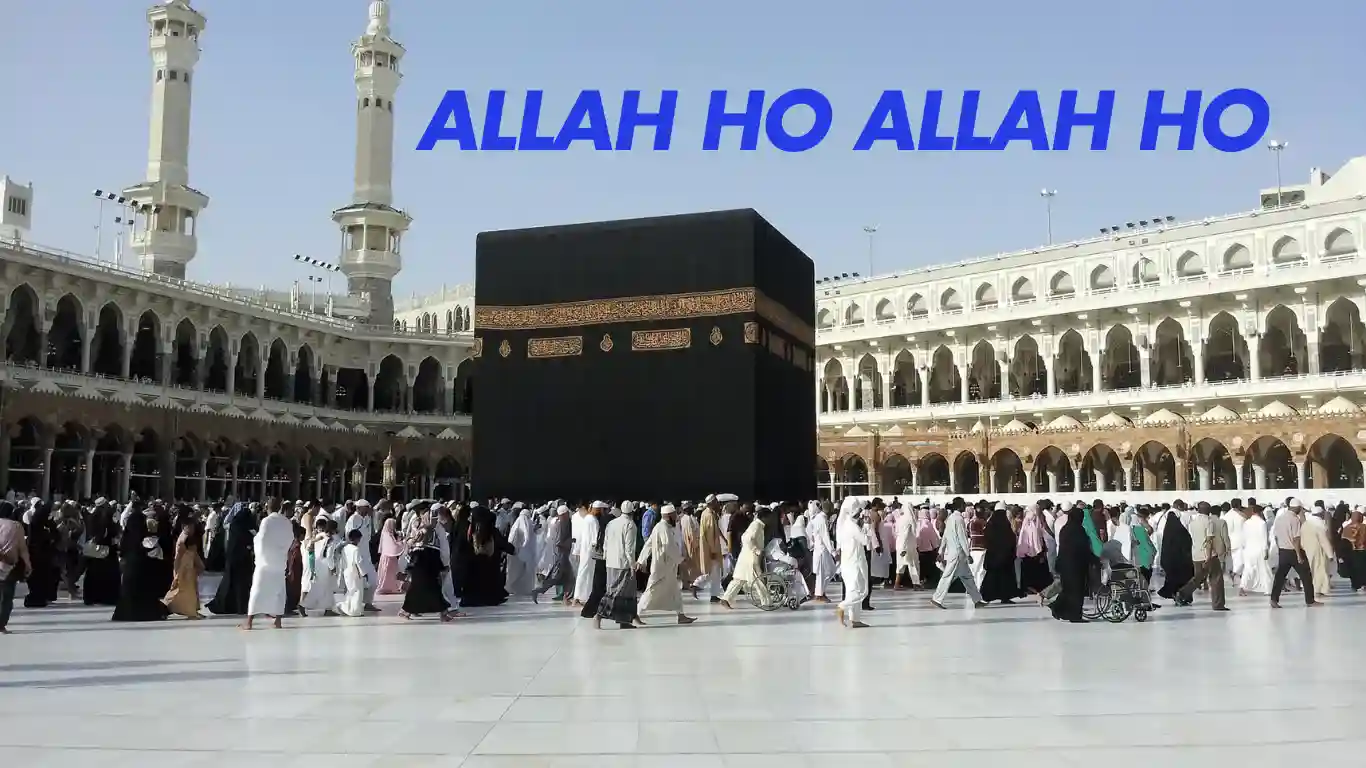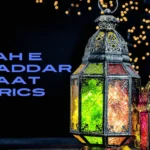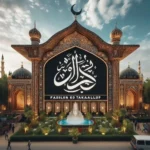The lyrics of Allah Ho Allah Ho are a poetic and heartfelt expression of devotion, encapsulating the essence of Islamic spirituality. This chant resonates deeply with believers, reminding them of the omnipotence, timelessness, and mercy of Allah. Let’s analyze each verse to uncover its profound meaning and spiritual significance.
| Tajdar e Haram – ho nigaah e karam Lyrics |
| Main Banda E Aasi Hoon Gunahgaar Banda Hoon |
| 12 Rabi ul Awal Naat | Eid Milad un Nabi |
| Mujhe Dar Pe Phir Bulana Lyrics in Urdu |
Verse 1: The Divine Declaration
Lyrics:
Allah Hoo, Allah Hoo, Allah Hoo
Malik ul mulk lashareeka lahoo
Wahadahoo laa ilaahaa illaahoo
Analysis:
This opening verse establishes Allah’s supreme authority over the universe. The phrase “Malik ul mulk” emphasizes that He is the Sovereign of all dominions, with no partner or equal (lashareeka lahoo). The declaration “Wahadahoo laa ilaahaa illaahoo” affirms the monotheistic core of Islam: “He is One; there is no deity but Him.”
Reflection:
This verse encourages believers to reaffirm their faith in Allah’s oneness and sovereignty. It reminds us of the Tawheed (monotheism) that forms the foundation of Islamic belief.
Verse 2: The Eternal Presence of Allah
Lyrics:
Yeh zameen jab na thii yeh jahaan jab na thaa
Chaand suraj na thay aasman jab na tha
Raaz-e-haq bhi kisi per ayaan jab na tha
Tab na tha kuch yahaan tha magar tu hee tu
Analysis:
This verse poetically describes a time before creation—when there were no earth, skies, sun, or moon. Yet, even in that void, Allah existed (tab na tha kuch yahaan, tha magar tu hee tu). It highlights His eternal nature and existence beyond time and space.
Reflection:
Believers are reminded of Allah’s timelessness and omnipresence, encouraging them to trust in His divine plan.
Verse 3: Gratitude and Human Imperfection
Lyrics:
Sana bashar k liyeah bashar sana k liyeah
Tamaam hamd sazawaar hai khuda k liyeah
Ata k samnay yarab khata ka zikar he kya
Tu ata k liyeah hai bashar khata k liyeah
Analysis:
This verse acknowledges Allah’s perfection and the contrast with human imperfection. All praise (tamaam hamd) is rightfully due to Allah. It humbly recognizes that humans are prone to errors, but Allah’s mercy and generosity are boundless.
Reflection:
The verse encourages gratitude for Allah’s blessings and motivates believers to seek His forgiveness, knowing He is ever merciful.
Verse 4: Sacrifices in the Path of Truth
Lyrics:
Kiyoon piyaa ibn-e-haidar nay jaam-e-fanaa
Khaal khichwai tabraiz ne kiyoon bhala
Daar per charh ke mansoor nay kia kaha
Sab banatay khilonay lay raha tu he tu
Analysis:
This verse recalls historical figures who sacrificed their lives for truth and devotion to Allah. From Hazrat Ali’s bravery (ibn-e-haidar) to Mansur al-Hallaj’s famous declaration (Ana al-Haqq), these acts of faith emphasize Allah as the ultimate truth and purpose.
Reflection:
The verse inspires believers to remain steadfast in their faith, even in the face of adversity, knowing that Allah is the ultimate reality.
Verse 5: The Essence of Allah
Lyrics:
Laa ilaahaa teri shaan ya wahdahoo
Tu khayaal-o-tajassus tu he aarzoo
Aankh ki roshni dil ki awaaz tu
Tha bhi tu, hai bhi tu, hoga bhi tu hee tu
Analysis:
This closing verse beautifully summarizes Allah’s role as the central focus of existence. He is the object of thought, imagination, and desire (tu khayaal-o-tajassus tu he aarzoo). His presence enlightens the heart and soul, reminding believers that He has always been and will always be.
Reflection:
The verse reinforces the eternal and unparalleled nature of Allah, urging believers to keep Him at the center of their lives.
Allah ho Allah ho Lyrics in Urdu
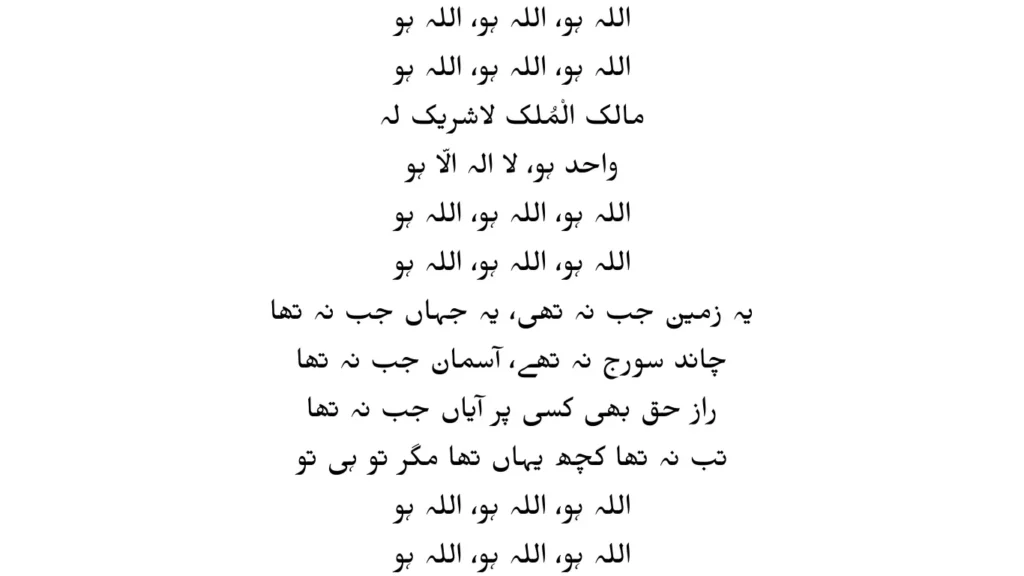
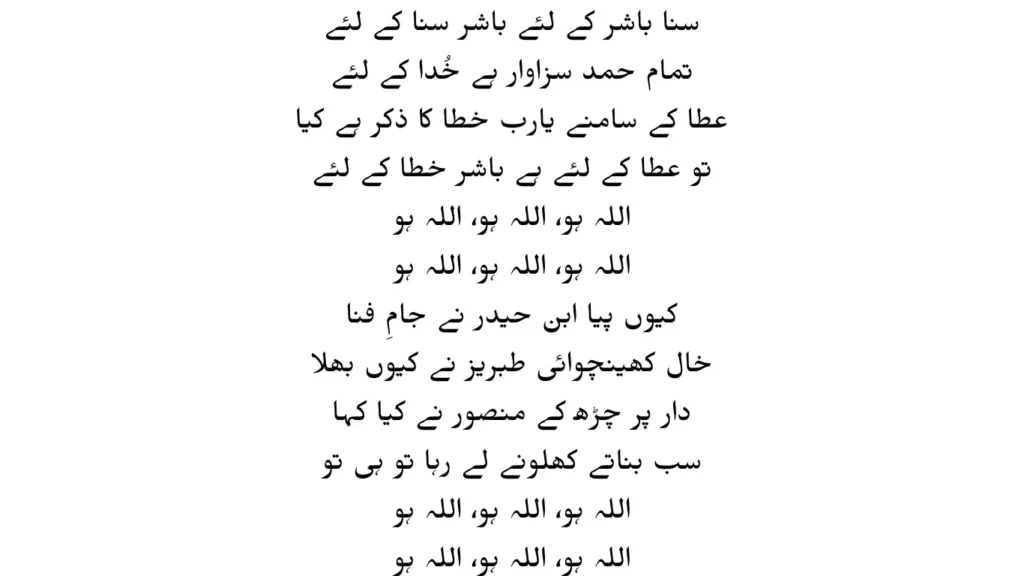
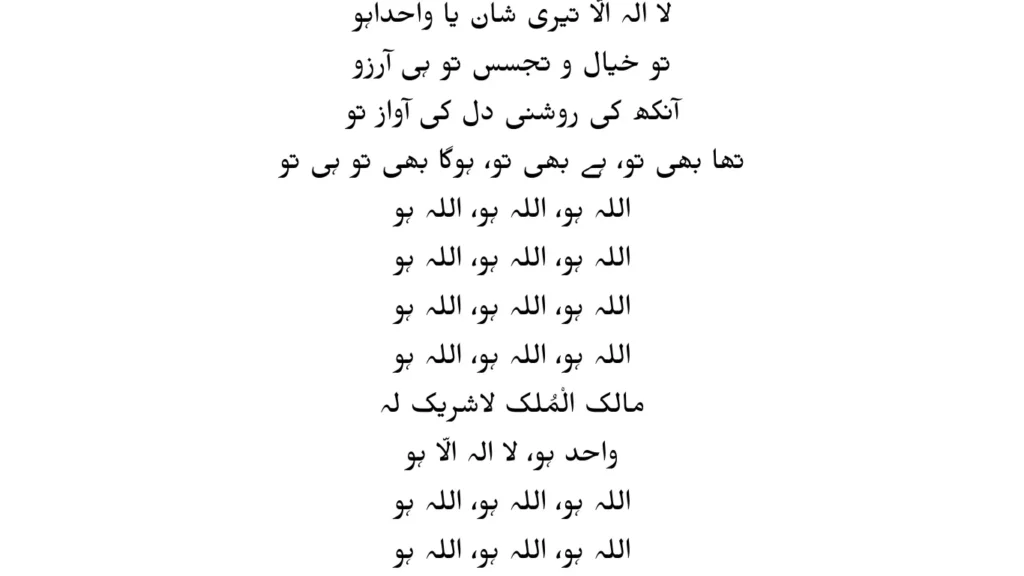
The Power of Remembrance: Dhikr and Spiritual Growth
- What Does “Allah Ho Allah Ho” Represent?
The chant symbolizes surrender to Allah’s will and acknowledgment of His supremacy. It fosters a sense of peace and spiritual connection. - The Role of Dhikr (Remembrance of Allah):
Repeating phrases like “Allah Ho” is a form of Dhikr, helping believers maintain mindfulness of Allah in daily life. - Importance of Gratitude in Islam:
Gratitude, as expressed in the lyrics, is a recurring theme in Islamic teachings, reminding believers to recognize Allah’s blessings.
FAQs:
Allah Ho Allah Ho” translates to “Allah is, Allah is.” It is a chant expressing Allah’s omnipresence and greatness.
Dhikr, or remembrance of Allah, strengthens faith, calms the heart, and brings believers closer to Allah through repetition of His names and praises.
The lyrics remind believers of Allah’s eternal presence, mercy, and supreme authority, encouraging gratitude, repentance, and steadfastness in faith.
